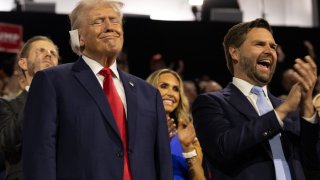Iran’s Election Provocation
If Tehran’s attempts to influence American elections go unpunished, there is every reason to expect further meddling in 2026 and 2028.
The Iranians miscalculated. And they know it.
During the 2024 election, the Islamic Republic not only engaged in political information warfare designed to defeat Donald Trump, but Tehran also contemplated ordering his assassination. As Attorney General Merrick Garland said in announcing the indictment against three suspects, it appears that “an asset of the Iranian regime…was tasked by [Tehran]…to direct a network of criminal associates to further Iran’s assassination plots against its targets, including President-elect Donald Trump” and “an American journalist who has been a prominent critic of the regime.”
It merits some consideration as to why Iran so escalated its longstanding shadow war with the United States. Perhaps the United States’ lack of a firm response to election interference by Russia in 2016 and by Iran itself in 2020 inadvertently signaled that more serious attacks on America’s political system would merely be absorbed. Perhaps Iran believed its brazen efforts could never be sourced back to the regime. Perhaps it is merely vengeance for Trump’s decision to kill Qasem Soleimani. Or perhaps, Tehran viewed the second Trump administration as an existential threat worth defeating by any means necessary. Knowledge of why Iran acted in this way can help shape the U.S. response. Because one thing is perfectly clear: this is not a situation where post hoc indictments will suffice.
Indeed, it appears that the Biden administration’s ferreting out of the Iranian plan and firm threat to Tehran “that it considered the threats against Trump a top-tier national security issue and that any attempt on his life would be treated as an act of war” led to “written assurances” last October that the regime would cease any efforts to murder Mr. Trump. Some peace may have been purchased through a credible demonstration of American will.
The contemplated assassination attempt on a former and future American president, however, should not distract from the fact that Iran’s efforts at election interference were a repeat offense. For example, in 2020, Iran engaged in an easily traceable effort to send “thousands of threatening emails aimed at U.S. voters…” Subsequent indictments did not stop Tehran. Iran engaged in sophisticated political warfare this cycle, including a successful cyber-burglary of the Trump campaign that purloined, among other things, a sensitive information file on incoming vice president JD Vance. There’s every reason to expect that if these provocations go unpunished, Iran’s present assurances—whatever they may be—will fade to gossamer, and Tehran will feel license to work even more reckless political warfare in 2026 and 2028.
After all, Iran’s recent informational and violent aggression takes place against continued provocations from Tehran. Iran crawls ever closer to a nuclear bomb, notwithstanding decades of bipartisan American nonproliferation efforts. And in a wildly under-covered affront, Al Qaeda’s likely current leader, Saif al Adel, appears to have operated freely from the Islamic Republic itself.
The United States must restore deterrence and protect our democracy from further Iranian aggression. This “warfare without warfare” is aimed at our integral institutions of government and consequently ought to be understood as an attack on a form of “critical infrastructure.” Washington may have succeeded in preventing a plot against Trump. Still, success is cold comfort against the knowledge that Tehran has shown a willingness to short-circuit a competitive and free election in a Western polity by eliminating one of the candidates. And the success in unraveling the threats to President-elect Trump does nothing to respond to Iran’s non-violent, informational, political warfare in the 2024 election.
Iran’s comprehensive attack on American self-government must be answered. A retorsion here would signal that the United States takes attacks on the critical infrastructure of our electoral transfer of power seriously. And it would serve a powerful signal to Iran’s allies in Moscow and Beijing—both of whom are waging election interference against the United States or its allies—that Washington’s days of absorbing the blows of political warfare are over. Moreover, assuming such a posture will help build out the necessary code of conduct that the liberal democratic West, in particular the Five Eyes nations, must build together on how to wage, through both preemption and response, the informational warfare aspect of unfriendly competition.
Therefore, the United States should commit to a policy of restoring deterrence against such election interference, specifically using Iran as a model. This does not require a kinetic or even violent response. As just one example, as Mark Dubowitz and Saeed Ghasseminejad have recommended, information warfare can be countered with our own information operations, coupled with “a persistent campaign to designate and expose individuals and entities supporting the regime’s information warfare efforts.” In the end, of course, all legally proportionate responses should be on the table.
Washington should be public about this policy, even if our ultimate reaction constitutes relatively quiet informational or electronic action tailored only to be clearly understood in Tehran and other adversary capitals. In addition, the United States and our allies should be clear that we are not merely responding once but moving to a permanently preclusive operational posture until Iran's behavior changes. In short, let the word go forth that attacks on liberal political systems, informational or otherwise, will be treated with the seriousness and severity they deserve.
Zac Morgan is an attorney specializing in First Amendment and campaign finance law. He previously worked for the Institute for Free Speech and currently serves as counsel to Commissioner Allen Dickerson of the Federal Election Commission. The views expressed in this article are his own and do not express an official view of the U.S. government.
Image: Maxim Elramsisy

